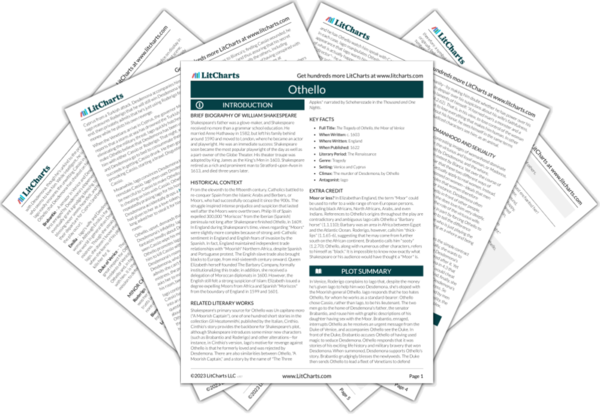Summary
Analysis
The Duke of Venice meets with his senators about a Turkish invasion of Cyprus. They manage to see through a Turkish ploy to make it look as if the Turks will attack Rhodes instead of Cyprus. Then the Duke and the Senators discuss how to repel the Turkish attack on Cyprus.
Games of illusion and appearance play a serious role in politics and war as well as in jealousy and love.
Themes
Quiz
Test Yourself
Othello and Brabantio enter along with their men. Brabantio demands that they cease discussing state business and instead deal with the fact that his daughter has been corrupted by spells and potions so that she would marry a man she would never otherwise have considered. The Duke promises to help Brabantio prosecute the man who has seduced Desdemona, but when he learns that the accused man is Othello he gives Othello a chance to defend himself.
Brabantio continues to insist, based on common racial, that Desdemona could never have been sexually drawn to someone of Othello's racial background in the absence of some kind of deception on his part. The Duke, though, who needs Othello's military leadership, is not so swayed by prejudice.
Themes
Quiz
Test Yourself
Othello admits that he married Desdemona. But he denies using any magic to win her love, and says that Desdemona will support his story. They send for her. As they wait for Desdemona to arrive, Othello says that Brabantio used to invite him to his house to hear his life story, with all its dramatic tales of travel, battle, and valor. These stories, Othello says, won Desdemona's love. The Duke comments that he thinks his own daughter might be won over by Othello's story.
The truly remarkable story of Othello's life, described by Othello in plain language, contrasts with the illusions that Iago will later build out of flowery words. Yet note that Othello does explicitly assert that storytelling has a seductive power, and Iago will indeed seduce Othello with his inventions later on.
Themes
Literary Devices
Quiz
Test Yourself
Desdemona arrives. Brabantio asks his daughter to whom she owes obedience. Desdemona responds that just as her own mother once had to shift her obedience from her own father to Brabantio, so must she shift her obedience from Brabantio to Othello. At this, Brabantio grudgingly gives up his grievance against Othello, and allows the meeting to turn back to affairs of state.
Desdemona asserts independence from her father and obedience to Othello. Women in this society were always obedient to some man, or at least were supposed to be. Men who did not keep their women obedient were seen as failures.
Themes
Quiz
Test Yourself
Get the entire Othello LitChart as a printable PDF.

As discussion turns back to fighting off the Turks, the Duke says that Othello must go to Cyprus to lead its defense. Though the Duke at first suggests that Desdemona stay in Venice with her father, Brabantio, Othello, and Desdemona all object, and the Duke says that she may go with Othello.
While she has both Othello and Brabantio backing her, here, Desdemona continues to assert her will in a highly public forum among men.
Themes
Quiz
Test Yourself
Brabantio exits, but not before warning Othello to watch Desdemona—since she disobeyed her father, she might disobey her husband.
Because Othello must leave for Cyprus that night, he decides that Desdemona should follow after him in the care of Iago, and asks Iago to have his wife attend Desdemona. Othello and Desdemona then exit to spend their last few hours together before Othello must depart.
Othello and Desdemona exhibit devotion to each other, although not excessive sexual passion. Othello clearly has faith in Iago, entrusting him with his wife.
Themes
Quiz
Test Yourself
Iago and Roderigo are left alone. Roderigo, convinced his chances with Desdemona are now hopelessly lost, talks of drowning himself. Iago mocks Roderigo for such silly sentimentality. Roderigo responds that he can't stop himself from feeling so miserable, but Iago disagrees, saying that a person can control himself by sheer force of will. He tells Roderigo to follow them to Cyprus, where he will make sure that Desdemona will end up with him—for a price. Roderigo exits.
In contrast to Roderigo's jealous despair, Iago emphasizes his belief that you can make yourself whatever you like—a theme related to his confidence in his own ability to direct everyone around him, tricking people into doing exactly what he wants.
Themes
Quiz
Test Yourself
Alone, Iago delivers a soliloquy in which he says again that he hates the Moor. He notes that there are rumors that Othello has slept with his wife, Emilia, and while he isn't at all sure that the rumors are true, he'll act as if they're true. He says that he will take Roderigo's money, and decides that he will convince Othello that Cassio is having an affair with Desdemona, and in so doing also get the position of lieutenant. He adds that Othello has a "free and open nature" (1.3.380) and therefore thinks that anyone who seems honest actually is honest, and that he will use this trait to lead Othello by the nose.
Iago lays out his plans to deceive the other characters, putting himself in the role of "director" of a kind of play-within-the-play. While he suspects that Othello has slept with his own wife, he seems relatively indifferent to whether or not this is true: Iago derives his sense of self, his manhood, from his ability to manipulate others, rather than sexual pride. He suggests that Othello's weakness is that he doesn't understand that appearance can hide reality. Not also that Iago seems to hold no racial prejudice against Othello at all. He just uses prejudice against Othello when it's helpful to him.
Themes
Quiz
Test Yourself












